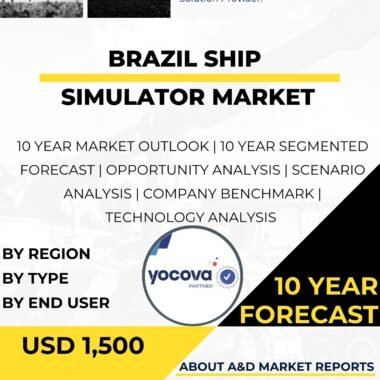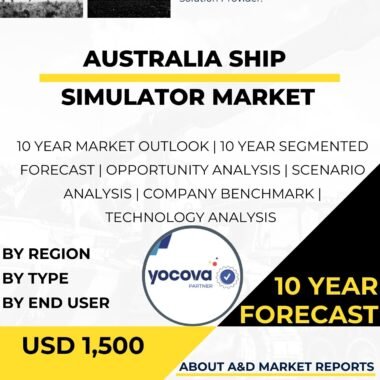Description
The Italy Ship Simulator market is a vital and dynamic segment within the country’s maritime industry, dedicated to providing advanced simulation solutions for maritime training and operational purposes. Ship simulators play a crucial role in modern maritime operations, offering realistic and immersive training environments for seafarers, naval personnel, and port operators. The Italy Ship Simulator market reflects the nation’s commitment to maintaining cutting-edge technology and innovation in the maritime sector, as it strives to equip its maritime community with state-of-the-art simulators to enhance safety, efficiency, and proficiency in ship operations.
Italy’s strategic location in the Mediterranean Sea and its rich maritime heritage underline the significance of having a robust and capable maritime training infrastructure. Moreover, Italy’s extensive commercial and naval fleet necessitates continuous training and readiness to ensure smooth and safe maritime operations. The Italy Ship Simulator market is driven by the need to provide the Italian maritime community with simulation solutions that offer realistic and interactive training experiences.
The Italy Ship Simulator market encompasses a wide range of simulation technologies, including full-mission bridge simulators, engine room simulators, cargo handling simulators, and Vessel Traffic Management System (VTMS) simulators. These simulators recreate various aspects of ship operations, including navigation, maneuvering, collision avoidance, cargo handling, and emergency response, allowing trainees to practice and enhance their skills in a controlled and risk-free environment.
One of the key players in the Italy Ship Simulator market is VSTEP, a leading Dutch company specializing in maritime simulation solutions. VSTEP provides state-of-the-art ship simulators and training software to maritime training centers and institutions worldwide, including Italy. The company’s expertise in ship simulation technology exemplifies Italy’s commitment to offering the best training tools to its maritime community.
The Italy Ship Simulator market also benefits from collaborations with international simulation companies and research institutions. Joint development programs and knowledge exchange initiatives foster innovation and enhance Italy’s competitiveness in the global market for ship simulators.
The Italy Ship Simulator market faces several challenges and opportunities. One of the primary challenges is the need to continuously innovate and upgrade simulation technologies to meet evolving training requirements. As maritime operations become more complex and technologically advanced, Italy’s ship simulators must keep pace with the latest developments in the maritime industry to offer realistic and effective training experiences.
Additionally, ship simulators must address the challenge of providing multi-faceted training scenarios. Simulation solutions must cater to various maritime disciplines, from ship handling and navigation to engine room operations and cargo management. Integrating multiple simulation modules into comprehensive training packages is crucial to ensuring that trainees receive a holistic and well-rounded learning experience.
Moreover, the Italy Ship Simulator market must address budget constraints while maintaining training effectiveness. Investing in advanced simulators and training facilities requires significant financial resources, and the Italian maritime community must carefully allocate training budgets to ensure that training centers have access to the latest simulation technologies.
Despite these challenges, the Italy Ship Simulator market presents numerous opportunities for growth and innovation. The increasing trend towards virtual and augmented reality in training offers new possibilities for ship simulators. Implementing VR and AR technologies in ship simulation can further enhance the realism and interactivity of training scenarios.
Moreover, the export potential for advanced ship simulator solutions enables Italy’s maritime industry to expand its market reach and forge international partnerships. Collaboration with friendly nations in joint training programs can lead to knowledge transfer and expertise exchange, bolstering Italy’s position as a reliable supplier of cutting-edge simulation solutions to global markets.
The growing emphasis on unmanned and autonomous vessels offers opportunities for Italy to develop innovative training programs in ship simulation. Integrating simulators with unmanned surface vessels (USVs) and autonomous boats can enable trainees to practice operating and managing unmanned maritime systems.
Furthermore, the use of advanced data analytics and performance monitoring in ship simulators offers opportunities for Italy to develop tailored training programs. Analyzing trainee performance and behavior during simulations can provide valuable insights for improving training methodologies and optimizing maritime operations.
In conclusion, the Italy Ship Simulator market is a vital and dynamic segment within the country’s maritime industry. The demand for advanced simulation solutions arises from Italy’s commitment to maintaining a robust and capable maritime training infrastructure and enhancing safety and efficiency in ship operations. Ship simulators play a crucial role in modern maritime operations, offering realistic and immersive training environments for seafarers, naval personnel, and port operators. By addressing challenges and embracing opportunities, Italy’s maritime industry can continue to deliver state-of-the-art ship simulators that contribute to the nation’s maritime safety, efficiency, and technological advancement. Collaboration with domestic and international partners, investments in research and development, and the integration of cutting-edge technologies are essential for the Italy Ship Simulator market to thrive and maintain a competitive edge in the global maritime simulation landscape.




